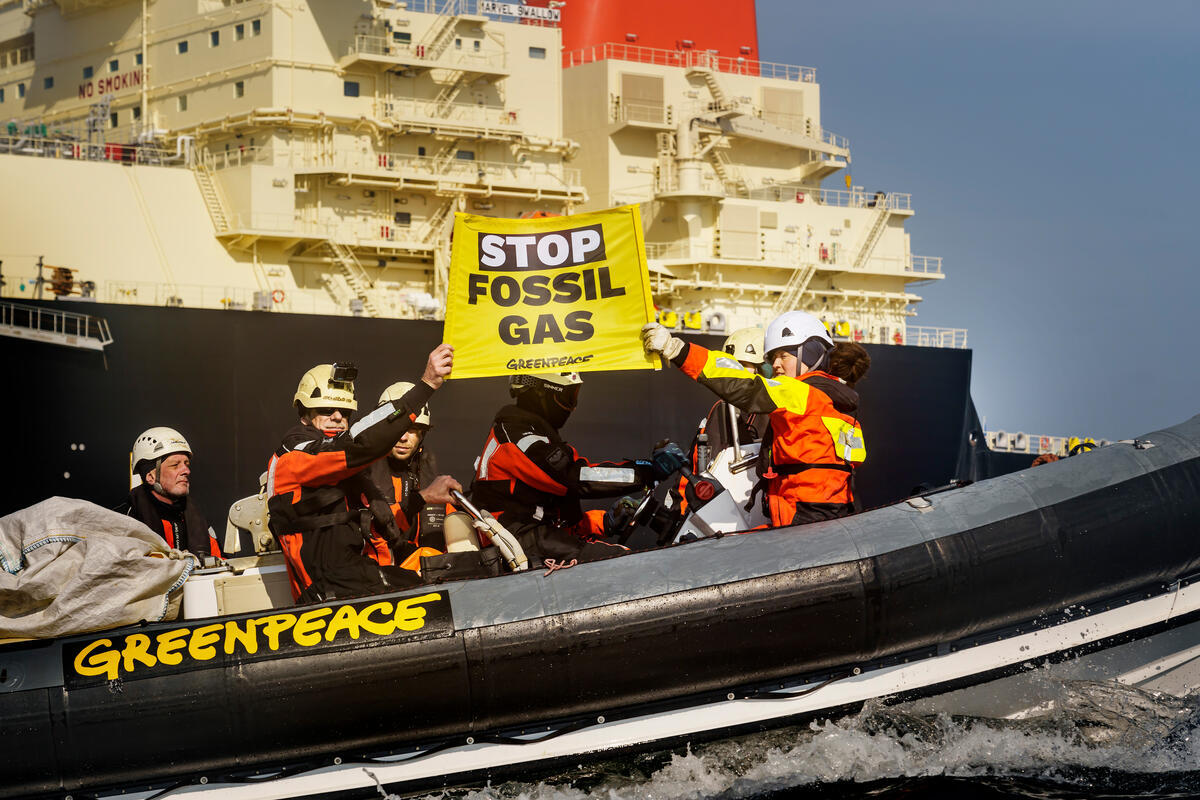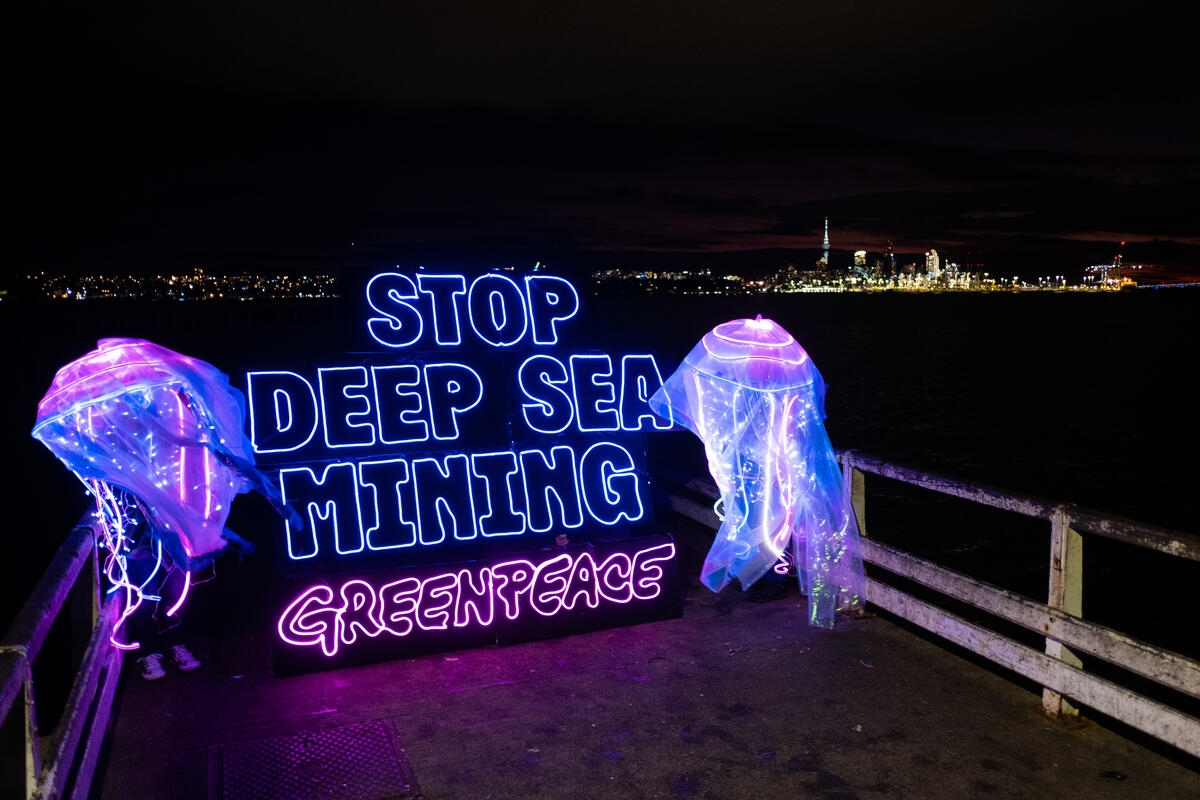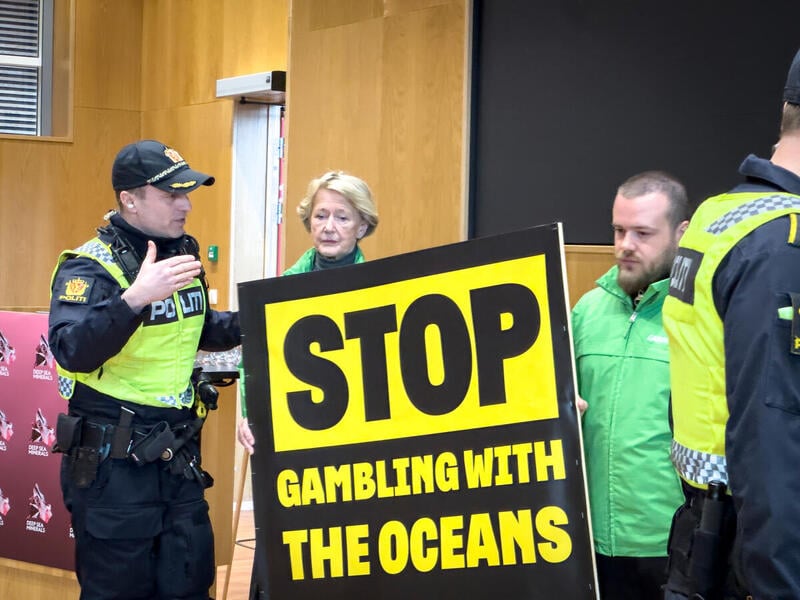Hamburg, Germany – A quarter of a century to the day after the Brent Spar campaign, oil companies continue to pollute the North Sea with thousands of tonnes of oil every year. [1] In 2017, the North Sea platforms emitted around 30 million tonnes of CO2, and 180,000 tonnes of chemicals and 9,000 tonnes of oil were discharged which is the equivalent of one tanker accident – every year – placing a heavy burden on the climate and the sea.
At the same time, 25 years on, Shell is once again proposing to leave their waste as part of its decommissioning plans for the remainder of the Brent platforms.
Greenpeace Germany marine biologist, Dr Christian Bussau, said:
“The North Sea is a huge industrial landscape with hundreds of oil and gas platforms, with Shell in particular making money by polluting our waters and the climate. While the rest of the world is imagining a just transition away from fossil fuels, companies like Shell are behaving exactly as they had when Shell planned on dumping the Brent Spar platform 25 years ago. Shell’s plans show that the sea will continue to be abused as a dumping ground for the profit for an industry that has long passed its shelf life.”
According to Shell, it plans to leave 11,000 tonnes of oil at sea in parts of three old oil platforms. [2,3] Greenpeace activists from the Netherlands, Germany and Denmark protested against these plans with the ship Rainbow Warrior in Shell’s Brent oil field in October 2019, demanding that these 11,000 tonnes of oil not remain in the North Sea but be brought to shore for proper disposal and recovery.
“The oil in the concrete bases of the platforms could seep into the sea. Oil is a toxic substance that contains carcinogens. When it enters the food chain, marine life and people are endangered,” said Bussau.
In 1995, Greenpeace protested in the Brent oil field against Shell’s plans to pull the oil tank and loading platform “Brent Spar” into the North East Atlantic and dump it there. The public support for the Brent Spar campaign pushed Shell to agree to dismantle the oil tank and loading platform on land instead of dumping it in the sea. The campaign also led to OSPAR Commission’s decision in 1998 to ban such dumping in the North East Atlantic.
A final decision on Shell’s plans is still pending: The UK government initially supported Shell’s plans and submitted them to OSPAR for consultation at the start of 2019. Germany lodged an official objection which ultimately led to a Special Consultative Meeting being convened under OSPAR in October last year; an unprecedented step demonstrating the seriousness of the issue. At that meeting, many other governments, including Sweden, Belgium, Denmark and the Netherlands, as well as the European Union, lent their support to the concerns expressed by Germany, especially regarding Shell’s plans to leave in place the 40 000 cubic metres of hazardous wastes, containing an estimated 11 000 tonnes of oil. [4,5]
“The North Sea must finally get long-term protection from unscrupulous oil companies. OSPAR member states and the EU must stop the production of oil in the North Sea. Otherwise the targets for marine protection and climate protection cannot be achieved. If we want to secure a future worth living for our children, we must get out of fossil fuels as quickly as possible,” added Bussau, who was also part of the 1995 Brent Spar protest.
ENDS
Photos and videos available here and here:
Notes:
[1] OSPAR report on discharges, spills and emissions from offshore oil and gas installations in 2017;
[2] Brent Decommissioning Programmes Environmental Statement BDE-F-GEN-HE-0702-00006:
Pages 425 + 430, Chart 17-4 + 18-1
[3] Shell U.K. Limited, BRENT DECOMMISSIONING DEROGATION ASSESSMENT, An Assessment of Proposals for the Disposal of the Disused Steel and Concrete Substructures of the Brent Field Installations, Submitted to the UK Department for Business, Energy and Industrial Strategy, Shell Report Number BDE-F-GEN-HX-7180-00001 November 2018, OSPAR CONSULTATION, Page 166, Chart 25
[4] OSPAR Convention for the Protection of the Marine Environment of the North-East Atlantic; Report on the Special Consultative Meeting according to OSPAR Decision 98/3 on the Disposal of Disused Offshore Installations; The United Kingdom’s intention to issue a permit under Paragraph 3(a) and 3(b) of OSPAR Decision 98/3 for leaving in-situ the footings of the Brent Alpha steel jacket and each of the gravity based concrete installations of Brent Bravo, Brent Charlie and Brent Delta
[5]https://www.ospar.org/site/assets/files/41322/ospar_pressrelease_special_consultative_meeting_18_10_2019_21.pdf
Contact:
Dr Christian Bussau, biologist and campaigner, Greenpeace Germany: +49 (0) 171 87 80 805,
Anna Arbogast, press officer, Greenpeace Germany: +49 (0) 175 80 41 025, [email protected]
Greenpeace International Press Desk: +31 (0)20 718 2470 (available 24 hours), [email protected]



